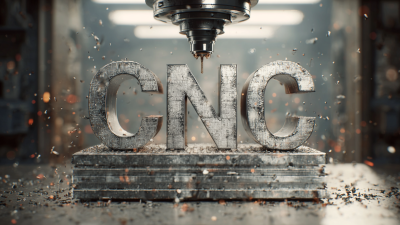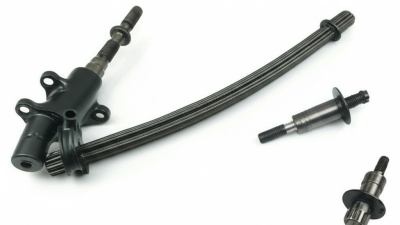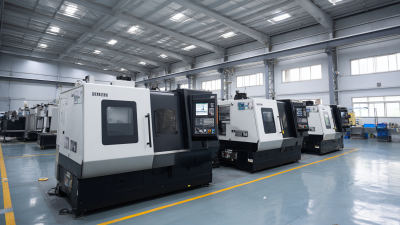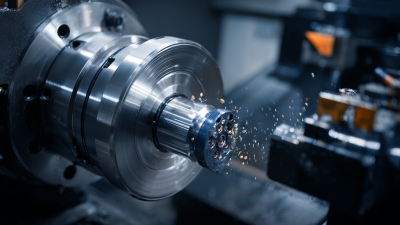
- sales@bjbod.com
- Mon - Sat at 7:00AM to 9:00PM

In the realm of modern manufacturing, CNC Turning has emerged as a pivotal technology, driving efficiency and precision in production processes. According to a report by MarketsandMarkets, the CNC machine tool market is projected to reach USD 100 billion by 2025, with CNC Turning playing a significant role due to its ability to produce complex geometries and tight tolerances. This growth is fueled by the increasing demand for high-quality components in industries such as aerospace, automotive, and medical devices. As manufacturers strive to enhance productivity while maintaining cost-effectiveness, the adoption of advanced CNC Turning techniques is poised to redefine conventional methods, enabling integration with smart manufacturing solutions and Industry 4.0. By optimizing workflows and automating processes, CNC Turning not only streamlines operations but also positions manufacturers to meet the challenges of an ever-evolving market landscape.

The evolution of CNC turning has significantly transformed from traditional methods to advanced digital precision, driven by innovations in technology and the integration of artificial intelligence. As the manufacturing landscape embraces next-generation CNC machining, AI promises to enhance precision, efficiency, and customization in production processes. This shift allows for more accurate toolpath development and improved thermal error predictions, critical for maintaining machining accuracy and quality in CNC turning operations.
Moreover, advancements such as 3D scanning and digital crafting are reshaping industries beyond conventional applications. The comparative analysis of traditional techniques against modern methodologies highlights the capabilities of digital tools in achieving intricate designs, as seen in sectors like shoe last manufacturing and stone processing. These technological improvements not only increase productivity but also pave the way for sustainable practices in manufacturing, ensuring that CNC turning remains at the forefront of precision engineering in the modern factory environment.
This chart illustrates the progression of CNC turning technology over the past two decades, showcasing improvements in precision machining capabilities measured in microns.
The evolution of CNC (Computer Numerical Control) turning has been profoundly influenced by a suite of digital manufacturing technologies. Innovations such as advanced simulation software and real-time monitoring systems empower manufacturers to optimize their workflows and enhance precision. These technologies enable better predictive maintenance, reducing downtime and ensuring that machinery operates at peak efficiency. As a result, companies can produce higher volumes of components with tighter tolerances, fulfilling the demands of complex engineering projects.

The advancement of CNC turning techniques has ushered in a new era of precision engineering, transforming modern manufacturing processes. With the incorporation of sophisticated algorithms and enhanced tooling systems, CNC machines now deliver unparalleled accuracy, enabling manufacturers to produce complex components with tight tolerances. This capability not only reduces material waste but also minimizes the need for extensive rework, streamlining production workflows and significantly boosting operational efficiency.
Moreover, advanced CNC turning technologies are equipped with real-time monitoring and feedback systems that allow for immediate adjustments during machining operations. This level of control ensures that each part meets predetermined specifications, thus maintaining high-quality standards across production runs. Additionally, the integration of automation and smart manufacturing practices is paving the way for more flexible production environments, where customization and rapid prototyping can be achieved without compromising on precision. As these techniques continue to evolve, they promise to redefine the standards of manufacturing excellence and set new benchmarks for accuracy in the industry.
| Technique | Advantages | Applications | Expected Efficiency Improvement (%) |
|---|---|---|---|
| High-Speed CNC Turning | Reduced cycle time, increased production rate | Automotive, Aerospace components | 25-50% |
| Multi-Axis CNC Turning | Enhanced complexity management, reduced setups | Medical devices, Complex geometries | 30-60% |
| CNC Swiss Turning | High precision for small parts, reduced waste | Watchmaking, Microengineering | 20-40% |
| Precision CNC Grinding | Improved surface finish, high dimensional accuracy | Aerospace, Tooling | 15-35% |
| Laser Assisted CNC Turning | Increased material cutting efficiency, improved performance on hard materials | Aerospace, Automotive | 30-50% |
The integration of
Internet of Things (IoT)
and
Artificial Intelligence (AI)
into CNC turning operations represents a transformative shift in modern manufacturing. By enabling real-time data collection and analysis, IoT facilitates smarter machining processes that can adapt to changing conditions, optimize production efficiency, and reduce waste. Through connected devices, manufacturers can monitor machine performance proactively, ensuring that any potential issues are addressed before they result in costly downtime or defects.
Moreover, AI algorithms enhance the CNC turning process by providing predictive maintenance solutions and advanced decision-making capabilities. These intelligent systems can analyze vast amounts of operational data to identify patterns and suggest optimizations that would be impractical for human operators to discern. As a result, manufacturers can achieve higher precision and consistency in their production lines, significantly improving overall productivity. This synergy of IoT and AI not only modernizes CNC turning but also paves the way for a more responsive and efficient manufacturing ecosystem in the years to come.
The future of CNC turning is set to revolutionize modern manufacturing through key trends that emphasize automation and sustainability. Automation in CNC turning not only enhances efficiency but also reduces human error, allowing for more precise and consistent production processes. With the integration of advanced robotics and intelligent software systems, manufacturers can streamline operations, optimize workflows, and significantly decrease turnaround times. This shift towards fully automated environments means that companies can better meet the demands of ever-evolving markets while maintaining high-quality standards.

Sustainability is becoming increasingly important in manufacturing, and CNC turning is no exception. New technologies are being developed to minimize waste, reduce energy consumption, and promote the use of environmentally friendly materials. Manufacturers are exploring ways to recycle chips and scraps generated during the machining process, turning potential waste into valuable resources. By adopting sustainable practices, the CNC turning industry can not only mitigate its environmental impact but also appeal to a growing consumer base that values green production methods. The convergence of automation and sustainability in CNC turning heralds a new era of responsible and efficient manufacturing.





